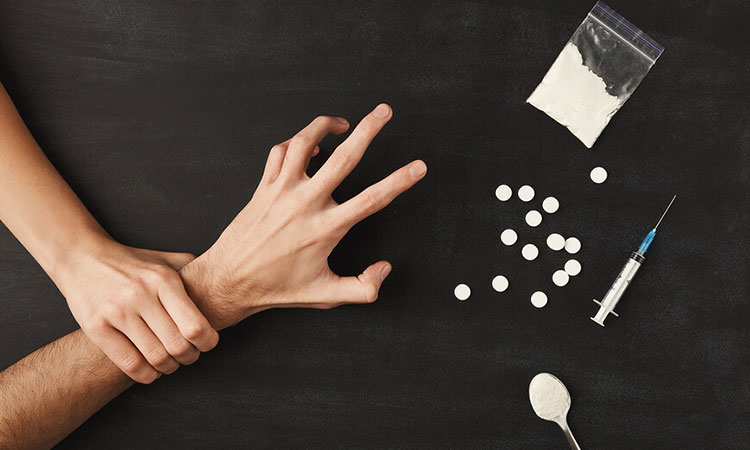
Opioid dependence is a condition that may develop following regular use of prescription or illicit opioids. While dependence is not addiction, per se, it is an integral part of its development.
Many factors, both personal and environmental, affect whether an individual who uses opioid drugs will continue taking them long enough to develop dependence or addiction. For those who do continue for a prolonged period, this may be due to the therapeutic effects of opioids and/or their ability to induce intense feelings of well-being.
What Are Opioid Dependence and Tolerance?
Repeated exposure to increasing dosages of opioids alters the brain so that it begins to function somewhat normally when drugs are present, and abnormally when they absent. Two important outcomes of this adaption are tolerance and dependence.
Opioid tolerance occurs because opioid receptors gradually become less responsive to opioid stimulation. Thus, a higher dose of opioids is needed to induce pleasure comparable to that once provided in past drug-using episodes.
Opioid dependence is a bit more complicated and involves changes in a region of the brain known as the locus cerulus. When opioid molecules bind to receptors on brain cells in this region, they suppress the neuronal release of noradrenaline, resulting in drowsiness, slowed respiration, and low blood pressure.
With repeated exposure, however, the neurons adjust by increasing their activity level. So, when opioids are present, their suppressive effect is offset by this increased activity, balancing the amount of noradrenaline so that the patient feels more or less normal. When opioids are not present to suppress the brain cells’ heightened activity, however, the neurons release excessive amounts of noradrenaline, causing jitteriness, anxiety, muscle cramps, and diarrhea, among other effects.
What Is Addiction?
Tolerance and dependence are typically precursors to and components of addiction but are not addiction in and of themselves. Addiction is a psychological feature that produces intense cravings and drives a person to engage in compulsive drug-seeking behavior despite the incurrence of adverse consequences.
We can see how an increased tolerance that results in escalating dosages and more frequent drug use can promote addiction. Tolerance can feed into chemical dependence, and once this occurs, quitting the use of opioids is impossible without encountering extremely unpleasant and often painful withdrawal symptoms.
Addiction develops as the pleasure induced from opioids’ activation of the brain’s reward system promotes continued drug use. Subsequently, repeated exposure to opioids provokes brain mechanisms that contribute to dependence. Next comes daily drug use in an effort to avoid the unpleasant symptoms of withdrawal. Further use induces longer-lasting changes in the brain that contribute to future compulsive drug-seeking behavior and related adverse consequences that herald addiction.

While symptoms and treatment for both dependence and addiction may be similar, it is important to distinguish between the two conditions. For example, a person can become dependent on legitimately obtained prescription opioids due to long-term use. However, they may not misuse these drugs, may not have cravings, and may incur little or no adverse effects.
Moreover, other than picking up a prescription as normal, they may not obsess over the attainment and use of this drug or seek to escalate drug use. Nonetheless, this doesn’t mean that there aren’t any elements of addiction and dependence that overlap.
The severity of any given addiction often comes down to other factors in the person’s life that either provoke or discourage improper drug use. Substance use, abuse, dependence, and addiction are all manifestations of the same problem that exist on a spectrum and can vary in intensity. Regardless, the end result for many is the need for medical detox and specialized treatment.
Signs and symptoms of opioid addiction may include the following:
- Taking the drug in greater amounts or for a longer period than originally intended or prescribed
- Persistent desire or failed efforts to cut down or quit opioid use
- Spending a significant amount of time and effort and using opioids and recovering from the effects
- Intense cravings or strong urges to use opiates
- Failure to attend to obligations at work, school, or home due to drug use
- Continued use of opioids despite persistent or repeated social or personal problems caused by use
- Continued use in situations which could be physically hazardous, such as driving
- Continued use despite being aware of potential physical or emotional problems
Opioid Withdrawal
Opioid withdrawal can be particularly challenging. Opioid withdrawal symptoms may include the following:
- Restlessness
- Muscle and bone pain
- Muscle spasms
- Sleep disturbances
- Diarrhea
- Nausea and vomiting
- Cold flashes
- Goosebumps
- Involuntary leg movements
- Agitation and irritability
- Anxiety
- Panic attacks
- Itchiness
- Rapid heart rate
- Mild hypertension
- Runny nose
- Sweating
- Shakiness
- Fever
- Seizures
- Fear and paranoia
Treatment for Opioid Dependence
Opioid dependence can be successfully treated using an array of therapeutic approaches, including behavioral therapy, counseling, medication-assisted therapy, group support, aftercare planning, and more.
Recovery By The Sea offers these services in both partial-hospitalization and intensive outpatient formats. Our highly-trained staff includes addiction specialists who are dedicated to helping people learn the skills they need to achieve abstinence, prevent relapse, and maintain long-term sobriety and wellness.
If you or someone you love is struggling with opioid dependence, call us today to discuss treatment options!